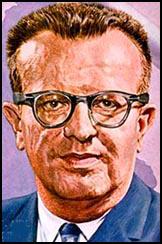Larry O'Brien

Lawrence (Larry) O'Brien was born in Springfield, Massachusetts, on 7th July, 1917. As a young man O'Brien met John F. Kennedy and helped him in his various political campaigns. This included managing his successful campaigns for the Senate in 1952 and 1958. O'Brien also played a significant role in Kennedy being elected president in 1960.
Kennedy appointed O'Brien as its special assistant in 1961. O'Brien was in the Presidential Motorcade in Dealey Plaza when Kennedy was assassinated. President Lyndon B. Johnson appointed O'Brien as Postmaster General in 1965 and he held the post of three years.
O'Brien remained active in the Democratic Party and was chairman of the Democratic National Committee (1968–69 and 1970–73). He was also employed by Howard Hughes to protect his interests in Washington.
On 20th March, 1972 Frederick LaRue and John Mitchell of the Nixon's re-election committee decided to plant electronic devices in O'Brien's Democratic campaign offices in an apartment block calledWatergate. The plan was to wiretap O'Brien's conversations. Frank Sturgis, Virgilio Gonzalez, Eugenio Martinez, Bernard L. Barkerand E.Howard Hunt were later arrested and imprisoned for this crime.
O'Brien was also commissioner of the National Basketball Association (1975–84). His achievements included the merger of the ABA with the NBA, negotiating and signing a lucrative television contract with CBS, arranging a historic collective bargaining agreement with the NBA Players Association and introducing an innovative anti-drug program in 1983. In 1984, the NBA Championship Trophy was renamed the Larry O'Brien Championship Trophy.
Lawrence O'Brien died in New York on 28th September, 1990.
Primary Sources
(1) H. R. Haldeman, The Ends of Power (1978)
For years Nixon had been trying to track down proof that Larry O'Brien was on Howard Hughes's payroll as a lobbyist at the same time that he was Chairman, of the Democratic National Committee. This could be hot ammunition to discredit O'Brien, Nixon believed. What had O'Brien done in exchange for Hughes's money (reportedly, a huge $180,000-a-year retainer)? A wiretap on O'Brien's telephone and a bug in his office could obtain the proof Nixon wanted.
To take such a risk as that burglary to gain that information was absurd, I thought. But on matters pertaining to Hughes, Nixon sometimes seemed to lose touch with reality. His indirect association with this mystery man may have caused him, in his view, to lose two elections.
His brother Don had been granted a $205,000 loan from Hughes in the 1950s when Nixon was Vice-President. Jack Anderson had broken that story shortly before the 1960 election, and Nixon felt his razor-thin defeat by John Kennedy was partially due to that story.
Then; in the 1962 California gubernatorial rare the loan had surfaced again, this time in a Reporter magazine article by James Phelan - and Governor Pat Brown could have credited his surprise victory over Nixon to the repercussions of that story.
And yet, even with this background,, at that very moment, unknown to me at the time, $100,000 of Hughes's cash was resting in a safe deposit box in Florida leased by Charles 'Bebe' Rebozo, Nixon's closest personal friend.
Years later, in 1976, I asked Nixon about that $100,000, which by then had been the subject of vigorous investigation for years. The investigation had finally petered out with no results. Rebozo explained that the $100,000 was a campaign contribution, and the reason it never reached the Campaign Committee was that an internecine war had broken out in the Hughes empire; Rebozo said he was afraid the President would be embarrassed by one side or another in the Hughes war if the campaign contribution was revealed.

